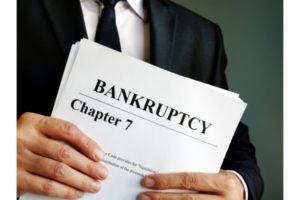How to Get a Chapter 7 Debt Discharge
 Filing Chapter 7 bankruptcy is a major decision. Bankruptcy can affect both your financial and personal life for years to come, so it is crucial to understand what you can and cannot get through a Chapter 7 bankruptcy filing. Are you eligible to file? And how do you get a Chapter 7 debt discharge?
Filing Chapter 7 bankruptcy is a major decision. Bankruptcy can affect both your financial and personal life for years to come, so it is crucial to understand what you can and cannot get through a Chapter 7 bankruptcy filing. Are you eligible to file? And how do you get a Chapter 7 debt discharge?
If you are eligible, Chapter 7 bankruptcy can offer you the relief you need from most unsecured debt. In some cases, it can even provide relief from secured debts. Find out what can and can’t be discharged by Chapter 7 bankruptcy.
Most Unsecured Debts are Dischargeable in Chapter 7 Bankruptcy:
Unsecured debts are debts or obligations that are not backed by collateral. In contrast, a secured debt is one for which you agreed to let the creditor take your property (i.e., home or car, etc.) if you did not fulfill the terms of the loan agreement.
- Medical Bills
- Utility Bills
- Back Rent
- Personal Loans
- Government Benefit Overpayments
- Credit Card Balances/Charges
Secured Debts MAY be Dischargeable in Chapter 7 Bankruptcy :
Any secured debt can be discharged, but the lien attached to the debt doesn’t go away. The creditor still has the right to recover the property that secured the debt as long as it is unpaid. A mortgage or car loan can be discharged, but the borrower will lose their house or vehicle. In some situations, losing the property may not be undesirable. For instance, if the filer doesn’t need or want the secured property, it can be advantageous to let the creditor take the property back.
A bankruptcy petitioner can indicate their intent to surrender property attached to a secured debt in their initial bankruptcy paperwork. The borrower won’t be responsible for returning the property to the creditor physically, but they should cooperate with the repossession. In some cases, smaller items will not be repossessed because the creditor determines they aren’t worth the expense of picking them up.
When Secured Debts Aren’t Quite “Secure:”
In other situations, loans that were designated as “secured” may not be as secure as expected. For instance, if a car dealer forgets to place a lien on the vehicle, the dealer’s unperfected lien could be avoided and the card could be seized. While this situation is possible, it is rare, and bankruptcy petitioners should not expect it to occur. Mr. Rannick was formerly counsel for a Chapter 7 Trustee. He and Ms. Whaley look carefully for problems like this to avoid them before they arise and in such a case might recommend a Chapter 13 in such an instance to protect the car.
Are There Debts Than Cannot Be Discharged?
Not all unsecured debt is dischargeable, however. Certain types of debt are impossible or hard to discharge through Chapter 7 bankruptcy. Some examples include student loans, debt incurred through fraud or false pretenses, luxury purchases, cash advances made not long before filing, divorce judgments, certain tax debt, etc. Sometimes a Chapter 13 reorganization plan can obtain better results than a Chapter 7.
There is no shame in turning to bankruptcy to seek a discharge of debt when unintended circumstances leave you struggling to provide for your family. Are you out of choices? Do you need help releasing your family from the chains of debt? Don’t hesitate to call Kenneth C. Rannick P.C., Tennessee and Georgia bankruptcy attorney. We help good people through bad times.
The post How to Get a Chapter 7 Debt Discharge appeared first on Kenneth C. Rannick, P.C..











